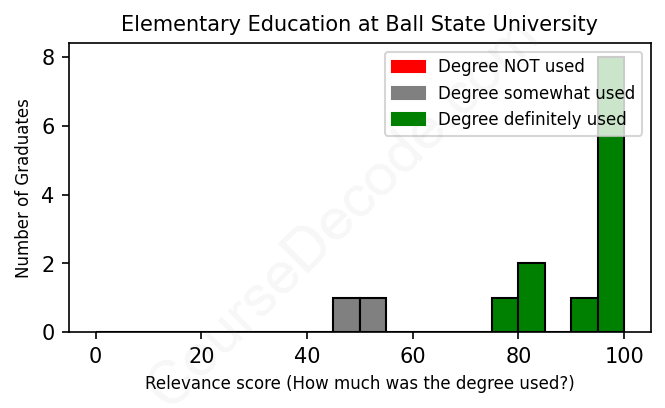
First, some facts. Of the Elementary Education graduates from Ball State University we've analyzed , here's how many have used (or NOT used) their degree in their career:

These are estimates based on AI analysis of 14 LinkedIn profiles (see below).
The verdict? Great! Overall, with an average relevance score of 88%, Elementary Education graduates from Ball State University have a substantially higher likelihood (+21%) of finding work in this field compared to the average graduate across all fields:
And for comparison, here's the chart for all profiles we've looked at across all degrees.
Also, after graduating, 42% of these graduates have pursued further education other than another Bachelor's degree (such as a Masters degree or other), compared to the average across all profiles of 35%. This suggests you may need more than just a Bachelors degree to be competitive as a Elementary Education graduate.
See the details:
|
Relevance score: 100% We think this person has gone into a career highly relevant to their degree. We think this person has gone into a career highly relevant to their degree.
DEGREE INFOGraduated in 2020 from Ball State University with a Bachelor's degree in Elementary Education. No other secondary education since. JOB HISTORY SINCE GRADUATIONElementary School Teacher WES-DEL COMMUNITY SCHOOLS Aug 2020 - Jun 2021 Student Teacher  WES-DEL COMMUNITY SCHOOLS Jan 2020 - Present Elementary School Teacher  Fowler Elementary School District Jun 2021 - Present ABOUT2nd grade teacher |
The top 10 most common jobs done by the graduates we've analyzed (ranked most common to least) are:
From analyzing the LinkedIn profiles of graduates from Ball State University with degrees in Elementary Education, it’s pretty clear that a majority of them have gone on to work in teaching roles that align closely with their educational background. Positions like 1st Grade Teacher, 4th Grade Teacher, and even coaching roles, such as Volleyball Coach, are common among these graduates. These jobs not only leverage the skills they learned during their studies—like child development, lesson planning, and classroom management—but also directly engage them in the field of education, which is what they trained for.
However, not all career paths have been as relevant to Elementary Education. Some individuals took on roles like Administrative Assistant or Legal Assistant, which don’t utilize the core teaching skills they developed in college. While these positions might offer important experiences in organization or communication, they stray far from the classroom environment these graduates were prepared for. On the whole, though, many of the jobs out there, especially the teaching ones, really do reflect a strong connection to what they studied, showing that their time at Ball State has set them up for success in education-related fields.
Here is a visual representation of the most common words in job titles for Elementary Education graduates (this is across all Elementary Education graduates we've analyzed, not just those who went to Ball State University):

The career trajectories of graduates from Ball State University with a degree in Elementary Education generally reflect a strong commitment to education, especially in their earlier years post-graduation. Most of these graduates often take on teaching roles immediately after finishing their programs, typically as classroom teachers for various grades in public and charter schools. For instance, numerous alumni began their careers as elementary school teachers, progressing from 1st to 6th grades and beyond. There’s a noticeable pattern where many teachers stick to classroom roles for several years, gaining valuable experience and often moving up to higher positions like Dean of Students or administrative roles within the school system over time.
As we look a little further down the line—about five to ten years after graduation—many of these education majors have either advanced within the education field or transitioned into related roles. A few have ventured into positions outside of traditional classroom settings, like instructional design or administrative positions, showcasing the versatility of their skills. However, a notable number have remained in teaching roles, indicating a strong passion for education. Some have even managed to hold multiple teaching positions across different schools, which can reflect a more unstable career path for a few. Overall, while there are some who have drifted away from education, many have successful and relevant careers in teaching, highlighting a solid foundation for those pursuing a similar path.
Getting a Bachelor’s degree in Elementary Education at Ball State University can be a pretty manageable experience, especially if you enjoy working with kids and have a passion for teaching. The coursework generally covers a mix of education theory, child development, and hands-on teaching practices, so you’ll definitely be doing a lot of engaging stuff. It might feel a bit challenging at times, especially with lesson planning and student teaching experiences, but it’s designed to be supportive and rewarding. Overall, it’s about average difficulty for a bachelor’s degree—if you stay organized and keep at it, you’ll probably find it is not as tough as some other majors, especially if teaching is something you're really into!
Most commonly, in the LinkedIn profiles we've looked at, it takes people 4 years to finish a Bachelor degree in Elementary Education.
So, looking at these Ball State grads from the Elementary Education program, it seems like most have stuck with teaching or related roles, which is pretty common in that field. While teachers typically don't make as much as folks in other professions, especially in the early years, many eventually move up to higher-paying positions like administrators or specialized roles (like the Dean of Students, for example). It looks like some have mixed in coaching and even some non-teaching roles, which might have provided additional income. Overall, it seems like they’re making a decent living, though it might not be as high as some careers in business or tech. If they keep climbing the ladder or find ways to diversify their skills, they could definitely boost that paycheck down the line!
Here is a visual representation of the most common words seen in the "about" section of LinkedIn profiles who have a Bachelor degree in Elementary Education (this is across all Elementary Education graduates we've analyzed, not just those who went to Ball State University). This may or may not be useful:

Here are all colleges offering a Bachelor degree in Elementary Education (ordered by the average relevance score of their Elementary Education graduates, best to worst) where we have analyzed at least 10 of their graduates: